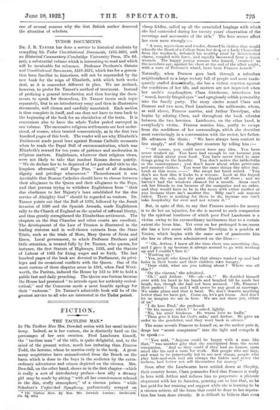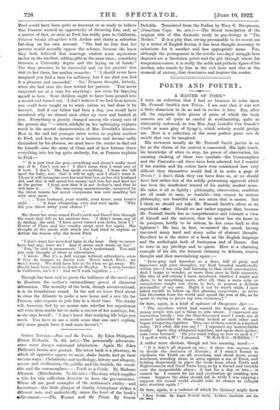FICTION.
THE TACTLESS MAN.*
Ix The Tactless Man Mrs. Dowdall writes with her usual incisive irony. Indeed, as is her custom, she is distinctly hard on the personages of her own creation. Fred Lambourn himself, the tactless .man " of the title, is quite delightful, and, to the mind of the present writer, much less irritating than Frances Todd, the heroine, whom he marries early in the book. A great many magistrates have animadverted from the Bench on the harm which is done to the boys in the audience by the extra- ordinary adventures and crimes depicted on the cinema. Mrs. Dowdall, on the other hand, shows us in the first chapter—which is really a sort of introductory preface—how silly a dreamy girl may be made by sitting " with all her consciousness relaxed in the dim, stuffy atmosphere." of a cinema palace " while Schubert's Unfinished Symphony, perfunctorily scraped on • The Tactless Man. By lion. Mrs. Dowdall. London : Duckworth. 17s. 04. net.]
cheap fiddles, called up all the unsatisfied longings with which she had contended during her twenty years' observation of the coverings and accessories of the rich." The love scenes affect her even more strongly :-
" A man, mysterious and tender, dressed in clothes that would wheedle the Head of a College from her des4. or a Lady Chancelloi from the woolsack, defeated his wealthy rival by disinterested charm, coupled with force, and rapidly recovered from a dozed wounds. The happy young woman who loaned, crushed,' as the novelists say, against his chest at the end of the affair might, with a turn of Fortune's wheel, have been Frances herself."
Naturally, when Frances goes back through a suburban neighbourhood to a large rectory full of people and moat inade- quately staffed domestically, she has a violent reaction against the conditions of her life, and matters are not improved when her uncle's stepdaughter, Clara Gatehouse, introduces her " round, heavily fringed eyes " and egregiously selfish personality into the family party. The story circles round Clara and Frances and two men, Fred Lambourn, the millionaire, whom, as said above, Frances marries, and Arthur Trevelyan, who begins by adoring Clara, and throughout the book vibrated between the two heroines. Lambourn, on the other hand, is everybody's victim. Frances marries him, partly to escape from the sordidness of her surroundings, which she describes most convincingly in a conversation with the rector, her father. He advances the thesis : " We have always been content to live simply," and the daughter counters by telling him :-
" Of course, you could never have any idea. You have never washed up. You have had enough to eat because yoll never think about your food. You have never tried to save things going to the laundry. You don't notice the tablecloths or the counterpanes ; you don't know about white petticoats and summer clothes. You wear the same things day after day. Look at this room —.' She swept her hand round. You don't see how dim it looks to a woman. Look at the frayed edges on the sofa, and the paint chipped off there ; and wo haven't had the windows cleaned for a month. Anna can't ask her friends to tea because of the margarine and no cakes, and they would have to be in the room with either mother or you because there isn't another fire. Billy can't ask anyone either. There is nothing for them to do, because one can't take hospitality for ever and not return it.' " But, in spite of this, to say that Frances marries for money is to do her an injustice, for she is moved to such compassion by the spiritual loneliness of which poor Fred Lambourn is a victim owing to his extraordinary tactlessness that to a certain extent she loves him. Yet even on her prolonged hcneymoon she has a love scene with Arthur Trevelyan in a gondola at Venice, which begins with the same sort of passionate kiss she has so often seen administered on the films :- "'Oh, Arthur, I knew all the time there was something else, and I gave it up because it always seemed to go with washing up and I couldn't face it.'
, Washing up ! '
Yes, people who kissed like that always washed up and had holes in their boots and their children were hungry.'
Dear child, what are you talking about ? Where was all this ? '
' On the cinema,' she admitted.
' Oh ! ' said Arthur. Oh—oh—oh ! He doubled himself over with his head in his hands and laughed till he made her laugh, too, though she had not been amused. ' Oh, Frances ! How perfect ! You and I will never be any good at marriage. We make plans and that is fatal. We don't deserve anything better than we have got. Come on, lot's get home. And don't let us imagine we are in love. We are not there yet, either of us.'
I do love Fred,' she professed. Or his money, which ? ' he asked, lightly. ' No, his utter kindness. Ho wants love so badly.'
Then give it him for God's sake,' said Arthur. He gave an order to the gondolier, and they wont back in silence."
The scene reveals Frances to herself or, as the author puts it, drags her "secret companion" into the light and compels it to speak :- "' You said, " Anyone could be happy with a man like that,' " was another gibe that she anticipated from the secret companion. And so they could if they had an honest, open mind like his and a taste for work. But people who are lazy, and want to be perpetually led to see new things, people who play hide-and-seek and are always the hiders and never the seekers, had better not sell themselves for money.' " Soon after the Lambourns have settled down at Shepley, their country house, Clara persuades Fred that Frances is really in love with Arthur and induces him to perpetrate a platonic elopement with her to America, pointing out to him that, as he has paid for her training and support while she is learning to be a cinema actress, all the harm that could be done to her reputa- tion has been done already. It is difficult to believe that even Fred would have been quite so innocent or so ready to believe that Frances wanted an opportunity of divorcing him, and, as a matter of fact, as soon as Fred has really gone to California, • Frances breaks altogether with Arthur and starts a suburban hat-shop on her own account. " She had no fear that her parents would actually oppose the scheme, because she knew they both believed that marriage confers some mysterious cachet on the intellect, adding gifts at the same time ; something between a University degree and the laying on of hands."
The shop promises to be successful and, on her parents' first visit to her there, her mother remarks : " should never have imagined you had a turn for millinery, but I am glad you find it a pleasure and successful.' No,' Frances thought, bitterly, when she had shut the door behind her parents. ' You never suspected me of a turn for anything ; not even for fancying myself in love. Your children ought to have been poured into a mould and turned out. I don't believe if we had been kittens you could have taught vs to wash unless we had done it by instinct. And if our father had been a dog, you would have wandered why we chased each other up trees and barked at you. Everything is greatly changed among the young cats of the present day "'—which sidelight on her upbringing explains much in the mental characteristics of Mrs. Dowdall's heroine. How in the end her younger sister writes to explain matters to Fred, and how he returns to a business and income sadly diminished by his absence, we must leave the reader to find out for himself—also the story of Clara and of how fortune threw everything into her lap quite uselessly, for, as Frances explains to Fred:— "'it is just that she gets everything and doesn't really want any of it. Can't you see ? I don't mean that I want any of It now. I don't. She has spoilt everything. I hope she will spoil the baby, too : that it will be ugly and I shan't want it.
I hope it will tyrannize over her and beat her, as her rich husband did, and that it will spend her money and ruin her and land her in the gutter. I hope now that it is not Arthur's, and that he will hate it. . . .' She was crying unrestrainedly, unnerved by the bitter taunts her secret companion was now assailing her with once more.
. . . Your husband, your wealth, your home, your lover's child . . . ' it kept whispering, over and over again. ' Why did you throw away your chance ? '
• She threw her arms round Fred's neck and kissed him through the tears that fell on his anxious face. ' I didn't mean any of it, darling,' she said. I have never turned you down, have I ? ' Horror of Clara and her cruelty swept over her again. She thought of the simile with which she had tried to explain to Arthur the reason why she loved Fred.
I don't want her wretched baby in the least. Only we never have had any, have we ? And it seems such waste on her.' ` Fan,' he said in amazement, I don't understand. You said you only thought of them as adventures.'
I laiow. But it's a dull voyage without adventures, even if they do happen to drown you. Never mind, Fred% we won't worry. We shall have lots to do when we go away. We should have been bored to death at Shepley. It is even lovelier in California, isn't it ? And we'll work together.. . "
Enough has been said to prove the brilliance of the novel and to illustrate the author's extraordinary power of character delineation. The morality of the book, though unconventional, is in its foundations sound. In the end we leave Fred about to cross the Atlantic to make a new home and a new life for Frances, who expects to join him in a short time. The reader will, however, feel by no means sure whether her experiences will even then enable her to make a success of her marriage, for, as she says herself : " I don't know that studying life helps you much. You have to use a sixth sense that one can't explain, only some people have it and some haven't."



































 Previous page
Previous page